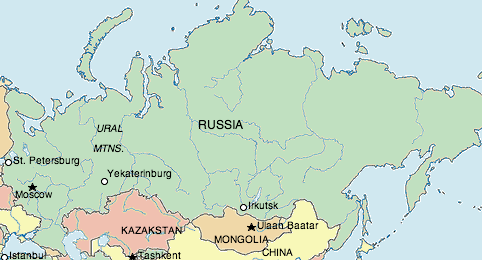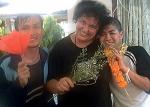To Siberia & Lake Baikal

We boarded a Moscow train at midnight. We are headed across Russia on the trans-siberian train system. However we will be breaking up the trip by getting off in Yekaterinburg and Irkutsk, with a side excursion to Lake Baikal, in Russia and Ulaan Bataar in Mongolia on the way to our final destination…Beijing China.
The next morning one of our cabin-mates, (there are four of us…two racks on each side of the cabin) Vladamir, starts his day with a bottle of beer. Enjoying the changing colors of the trees as we climb and dip through the Urals our cabin mates and we share all our packed lunches with each other and Vladamir, who knows no English shares his vodka with us. Diana, who is a translator in German/Russian for a Moscow law firm) does speak English, tells me there is no Russian like Frank Sinatra…and that she doesn’t like Antonio Banderas because he is “dark.” (We have discovered that anyone “dark” is called “black” and is discriminated against…as are homosexuals…hardly anyone out of the closet here.)
Unknown to each other, they are both traveling to their home town of Yekaterinburg, the third biggest city in Russia, to visit their parents. On the way our rich Moscow train passes through dirt-poor even though picturesque villages and Vladamir gets off at a town famous for it’s glass factory to buy a set of crystal glasses (about a dozen glasses for about $20) and bag of apples from the sellers who are tapping at our window. Regulars know what to buy at each stop-whether a bag of berries picked by bucket in the forest or a baked chicken from a babushka (grandmother). We even saw men hawking huge chandeliers. One man was trying to sell a stuffed bird with a wing span six feet wide!
An ex-pirate by the name of Yermak, who is recognized as the founder of Siberia, crossed the Ural mountains and challenged the fur traders for control of the land. In November 1581 he raised the Russian flag. By 1900 over a million people had made he long march to the squalid and overcrowded gulags of Siberia and the word, Siberia, came to mean a place for criminal and political exiles.
In 1891 Tsar Nicholas III began construction on the railway from Moscow to Vladivostock on the east coast of Russia near the Sea of Japan. The greater part was built without heavy machinery bu by men wit nothing more than wooden shovels. Nevertheless, they could lay up to 2.5 miles of rail in a good day, according to the Trans-Siberian Handbook. Most of the labor force had to be imported as local peasants were already employed on the land and the workers came from as far away as Italy and Turkey but the Chinese coolies were terrified of the Amur tigers with which the area full and the government subsequently turned to the prisoners in the gulags to relieve the shortage of labor.
The trans-Mongolian line (to Beijing) branches off from the main Trans-Siberian route (to Vladivostock) at Zaudinsky and follows the well worn route of the ancient tea caravans that traveled between Beijing and Moscow in the 18th and 19th centures. In those days traders made the 7865km journey in no less than 40 days. Since the railroad began operating in the mid-1950’s the journey now takes about 5.5 days.
The world’s largest country, Russia covers 17.1 million square km. Most of Russia’s 145 million people are ethnic Russian but there are scores of small ethnic groups with their own languages, traditions and religions including the largest, the Buryats, and the Tatars, Yakuts, Tuvans, Evenki and Nentsy. Mainly flat, the country rises slightly in the Urals which mark the border between European Russia and Siberia. The 3690 km long Volga River is Europe’s longest waterway.
There are over one million lakes in Siberia the largest of which is Lake Baikal where we will spend five days in a Buryat fishing village. It holds nearly 1/5 of the world’s water…reaching up to a mile deep…a division between two teutonic plates we are told and widening two centemeters each year eventually splitting the continent in two. We read that if all the world lost it’s supply of drinking water that Lake Baikal could supply the world for 40 years!
Situated in south-east Siberia, the 3.15-million-ha Lake Baikal is the oldest (25 million years) and deepest (1,700 m) lake in the world. It contains 20% of the world’s total unfrozen freshwater reserve. Known as the ‘Galapagos of Russia’, its age and isolation have produced one of the world’s richest and most unusual freshwater faunas, which is of exceptional value to evolutionary science.
Tags: Culture, Europe, Russian Federation, Trains, Trans Siberia, Trans Siberia Train, UNESCO World Heritage Sites, Video, Videos, World Heritage Site


Leave a Reply